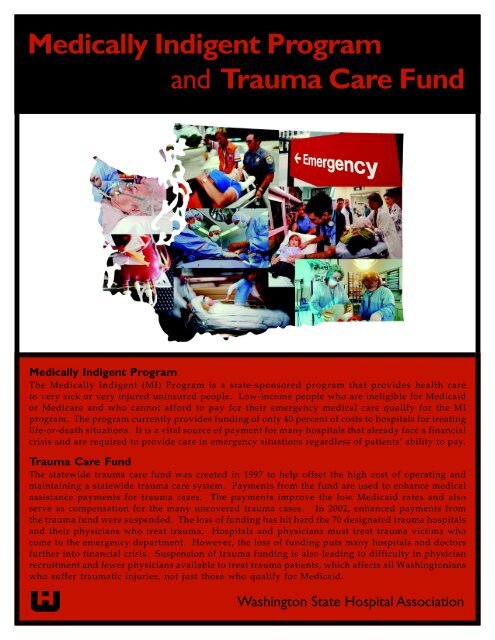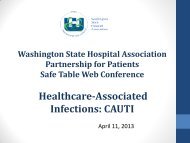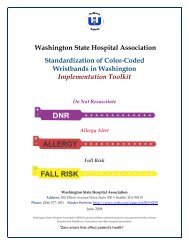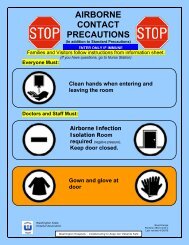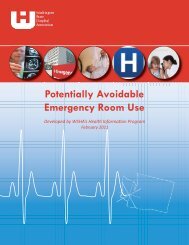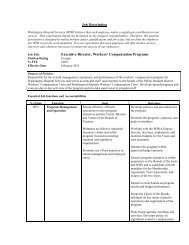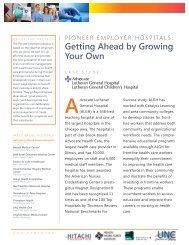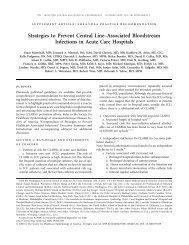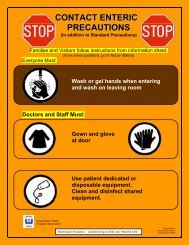Medically Indigent Program - Washington State Hospital Association
Medically Indigent Program - Washington State Hospital Association
Medically Indigent Program - Washington State Hospital Association
You also want an ePaper? Increase the reach of your titles
YUMPU automatically turns print PDFs into web optimized ePapers that Google loves.
<strong>Medically</strong> <strong>Indigent</strong> <strong>Program</strong><br />
and Trauma Care Fund<br />
<strong>Medically</strong> <strong>Indigent</strong> <strong>Program</strong><br />
The <strong>Medically</strong> <strong>Indigent</strong> (MI) <strong>Program</strong> is a state-sponsored program that provides health care<br />
to very sick or very injured uninsured people. Low-income people who are ineligible for Medicaid<br />
or Medicare and who cannot afford to pay for their emergency medical care qualify for the MI<br />
program. The program currently provides funding of only 40 percent of costs to hospitals for treating<br />
life-or-death situations. It is a vital source of payment for many hospitals that already face a financial<br />
crisis and are required to provide care in emergency situations regardless of patients’ ability to pay.<br />
Trauma Care Fund<br />
The statewide trauma care fund was created in 1997 to help offset the high cost of operating and<br />
maintaining a statewide trauma care system. Payments from the fund are used to enhance medical<br />
assistance payments for trauma cases. The payments improve the low Medicaid rates and also<br />
serve as compensation for the many uncovered trauma cases. In 2002, enhanced payments from<br />
the trauma fund were suspended. The loss of funding has hit hard the 70 designated trauma hospitals<br />
and their physicians who treat trauma. <strong>Hospital</strong>s and physicians must treat trauma victims who<br />
come to the emergency department. However, the loss of funding puts many hospitals and doctors<br />
further into financial crisis. Suspension of trauma funding is also leading to difficulty in physician<br />
recruitment and fewer physicians available to treat trauma patients, which affects all <strong>Washington</strong>ians<br />
who suffer traumatic injuries, not just those who qualify for Medicaid.<br />
<strong>Washington</strong> <strong>State</strong> <strong>Hospital</strong> <strong>Association</strong>
Who is helped by <strong>Medically</strong> <strong>Indigent</strong><br />
and Trauma programs<br />
Almost all hospitals in <strong>Washington</strong> state receive funding from the <strong>Medically</strong><br />
<strong>Indigent</strong> and Trauma care programs. Over 2,000 critically ill persons per<br />
month across <strong>Washington</strong> get help from these programs.<br />
Case Study Sites
Who Is Helped by <strong>Medically</strong> <strong>Indigent</strong> and Trauma <strong>Program</strong>s<br />
People all across <strong>Washington</strong> are helped by the life saving services these programs<br />
provide. Here are some of their stories:<br />
Harrison Memorial<br />
Harrison Memorial <strong>Hospital</strong> is a 297 bed hospital located in Bremerton. The hospital sees<br />
49,000 patients a year in the emergency room. Last year the hospital provided $2.1 million<br />
in charity care and forgave $2.7 million bad debt for patients unable to pay for their care.<br />
All of the following patients were residents of Kitsap County.<br />
• A 56 year-old single male was diagnosed with cancer. At the time of his diagnosis he<br />
was uninsured, unemployed, and unable to cover major medical expenses. Diagnostic<br />
and treatment regimens significantly improved his likelihood of cancer survival.<br />
• A 45 year-old married female with one child was diagnosed with disease of the pancreas.<br />
Her husband was unemployed at the time of her diagnosis and she was trying to support<br />
the family through her own self-employment. They did not have health insurance.<br />
• A 63 year-old male self-employed dentist was diagnosed with a bulging aorta with<br />
serious risk of rupturing and possible death. The patient had numerous radiographic<br />
and surgical procedures and a lengthy hospital stay. He did not have health insurance<br />
and was unable to absorb the significant costs of medical procedures.<br />
• A 20 year-old single female working as a receptionist was admitted for a diabetic<br />
emergency with exceptionally high blood-acid levels. This was only one in a series of<br />
hospitalizations resulting from her chronic diabetic condition. While the first hospital<br />
received some payment for the first hospitalization, subsequent hospitalizations were<br />
disallowed since the MI eligibility is limited to emergency services received over a<br />
single three-month period in a given year.<br />
Providence Everett Medical Center<br />
Providence Everett Medical Center is a 463 bed hospital located in Everett. The hospital<br />
sees approximately 75,000 patients a year in the emergency room. Last year the hospital<br />
provided $5 million in charity care and forgave $11 million bad debt for patients unable to<br />
pay for their care.<br />
• A 14 year-old girl from Everett, <strong>Washington</strong> was violently assaulted while walking down<br />
a bike path early one morning. She had been stabbed in the abdomen, puncturing her<br />
aorta and other major arteries. The injury is very often fatal. When medics got to her,<br />
she had lost a large amount of blood and was unresponsive. She was transported to<br />
Providence Everett Medical center where she received immediate vascular surgery and<br />
was able to make a slow but steady recovery.<br />
• A 21 day-old baby boy was riding in his car seat when another vehicle struck the side of<br />
the car at high speed. The impact created a two-foot intrusion to the passenger side<br />
where the baby sat. At the scene medics found the baby with a weak pulse and an<br />
extremely rapid heart rate. In addition to head injuries and broken ribs, the baby’s chest
wall had been punctured and he was unable to breath. He was treated urgently with a<br />
chest tube which saved his life. After he was stabilized, he was tranferred to Harborview<br />
for pediatric intensive care. During his rehabilitation, he spent a long time on<br />
ventilation, but is now smiling and interacting with his family.<br />
Harborview Medical Center<br />
Harborview Medical Center is a 413 bed hospital located in Seattle. It is the state’s only<br />
Level I adult and pediatric trauma center, caring for the community’s most seriously<br />
injured patients. The hospital sees approximately 85,000 patients a year in the emergency<br />
room. Last year the hospital provided $36 million in charity care and forgave $24 million in<br />
bad debt for patients unable to pay for their care. Approximately half of all patients<br />
entering the emergency department have injuries classified as serious, critical, or major.<br />
Because of the high volume of trauma care provided at Harborview, the medical center is<br />
provided with a block grant in trauma funds to help defray the high cost of providing this<br />
complex care.<br />
• A 40 year old self-employed welder from Marysville had a long history of seizure<br />
disorders, but was unable to pay for his seizure medication. As a result, he was forced<br />
to cut back on the medications necessary to control his seizures. One day while driving<br />
he had a seizure, hit a telephone pole, and sustained fractures to his spine and one of his<br />
legs. During evaluation and treatment at a community hospital, he had several more<br />
severe seizures and had a breathing tube inserted. He was transferred to Harborview<br />
where he was treated for two weeks for his seizure disorder and also received treatment<br />
for his spine and leg fractures.<br />
• A 48 year-old woman from Gold Bar had been experiencing severe headaches for over a<br />
month. Upon admission to her community hospital, the headaches were accompanied<br />
with dizziness. A CT scan showed a brain hemorrhage. She was transferred to<br />
Harborview where surgery was performed to repair the hemorrhage. The patient<br />
remained hospitalized for nearly a month. She returned home where she resumed her<br />
life as a homemaker and sales manager.<br />
• A 40 year-old laborer was working with an axe when he dislodged a piece of wire that<br />
flew up and hit him in the eye, penetrating his eyeball. He came to Harborview from<br />
Port Angeles for emergency surgical intervention. Surgeons brought him immediately to<br />
the operating room to extract the wire, irrigate the eye, and ensure proper drainage to<br />
the injured eye. He was hospitalized overnight.<br />
• A 50 year-old self-employed truck driver and father of two from Lynnwood had been<br />
experiencing pain to his left calf while walking. The pain gradually progressed to the<br />
point where his pain was quite intense, even while resting. As a result of this pain, he<br />
had to quit working. After three months of enduring the pain, he came to the<br />
Harborview Emergency Department where he was found to have significant disease in<br />
the arteries of his leg. He eventually required surgical intervention and nearly a week of<br />
hospitalization.
Tacoma General <strong>Hospital</strong><br />
Tacoma General <strong>Hospital</strong> is a 298 bed hospital located in Tacoma. The hospital sees 82,000<br />
patients a year in the emergency room. Last year the hospital provided $3.4 million in<br />
charity care and forgave over $9 million bad debt for patients unable to pay for their care.<br />
• A 49 year-old woman was involved in a nearly fatal automobile accident. She spent 44<br />
days in the intensive care unit and another ten days in the hospital before being<br />
discharged to an inpatient rehabilitation facility. During her hospital stay, she<br />
underwent four surgeries.<br />
• A 22 year-old man was airlifted to the Tacoma Trauma Center following a serious<br />
snowboarding accident. While he was employed as a chef, he was uninsured. During his<br />
three-day stay at Tacoma General hospital, the young man had one surgery and no<br />
complications.<br />
• A 19 year-old student suffered serious injuries in a motorcycle crash, sending him to<br />
Tacoma General’s Trauma Center. The victim, who was wearing a helmet, spent five days<br />
in the hospital and had one surgery.<br />
Providence St. Peter <strong>Hospital</strong><br />
Providence St. Peter <strong>Hospital</strong> is a 390 bed hospital located in Olympia. The hospital sees<br />
approximately 55,000 patients a year in the emergency room. Last year the hospital<br />
provided $4 million in charity care and forgave $4 million bad debt for patients unable to<br />
pay for their care.<br />
• A 20 year-old Western <strong>Washington</strong> University student from Thurston County was rock<br />
climbing on vacation in Canada when a heavy bolder fell, knocking her off the mountain,<br />
and crushing her ankles and left leg. A friend climbed down the mountain and carried<br />
her back to the top to get medical help. When they evacuated her to the local medical<br />
center she was turned away because she had no insurance. She was then taken to<br />
Vancouver <strong>Hospital</strong>, but because she had no insurance she received only superficial<br />
treatment. A Vancouver doctor knew she could get care in the states and had her<br />
transferred to Providence St. Peter <strong>Hospital</strong>, close to her home. She went through three<br />
surgeries to fix her legs and was transferred to Harborview for another surgery where<br />
she stayed for her recovery. Without the MI program, this woman may not have received<br />
the treatment she desperately needed and could have been permanently disabled.<br />
• A 44 year-old father of two children from Yelm, <strong>Washington</strong> had recently lost his job as a<br />
construction worker and therefore also lost health insurance coverage for his family. His<br />
wife did not have health insurance coverage through her work and they could not afford<br />
private insurance. While he was doing odd jobs, a skill saw slipped and nearly severed<br />
his entire left hand. He was transported reluctantly to the hospital and was very upset<br />
upon arrival. He wanted to be released immediately because he could not pay the bill.<br />
He said he would rather loose his hand than bankrupt his family. The <strong>Medically</strong><br />
<strong>Indigent</strong> program, however, helped defray the costs of his treatment, including multiple<br />
surgeries and rehabilitation. He is currently in outpatient rehabilitation, is able to move<br />
some of his fingers, and should be able to go back to work soon.
Southwest <strong>Washington</strong> Medical Center<br />
Southwest <strong>Washington</strong> Medical Center is a 360 bed hospital located in Vancouver,<br />
<strong>Washington</strong>. The hospital sees 112,000 patients a year in the emergency room. Last year,<br />
the hospital provided $3.6 million in charity care and forgave $8 million bad debt for<br />
patients unable to pay for their care.<br />
• A 23 year-old male from Vancouver, <strong>Washington</strong> was struck at high speed by another<br />
vehicle on the driver’s side. Despite wearing a seatbelt, he suffered multiple fractures<br />
and injuries to his brain, face, arms, legs, and internal organs. He was unconscious and<br />
in critical condition upon arrival at the hospital and required a full resuscitation team to<br />
keep him alive. After being stabilized, he underwent neurological, orthopedic, and<br />
plastic surgery. He spent 10 days in the intensive care unit, followed by 14 additional<br />
days of hospital care. He was eventually discharged to a skilled nursing facility where<br />
he was put on breathing and feeding tubes. He was later admitted for inpatient<br />
rehabilitation and showed significant improvement. At the time of injury he had a<br />
supportive family and was enrolled in a college masters program.<br />
• A 21 year-old male passenger from Vancouver, <strong>Washington</strong> was in the backseat wearing<br />
a seatbelt when he was involved in a motor vehicle crash. He sustained serious injuries<br />
to his spine, spinal cord, lungs, internal abdominal organs, as well as significant brain<br />
injury. He required multiple surgeries and intensive care. He was in the hospital 47<br />
days, and then was transferred to an inpatient rehabilitation facility where he was put on<br />
a ventilator. Although he was alert and slowly recovering from his brain injury, he<br />
remained totally paralyzed from his neck down. Upon discharge from rehabilitation, he<br />
had made progress in his ability to manage his power wheelchair. At the time of his<br />
discharge, he hoped to finish his education and was learning to use a computer with an<br />
assistive device.<br />
Central <strong>Washington</strong> <strong>Hospital</strong><br />
Central <strong>Washington</strong> <strong>Hospital</strong> is a 206 bed hospital located in Wenatchee. The hospital sees<br />
approximately 28,000 patients a year in the emergency room. Last year, the hospital<br />
provided $1.8 million in charity care and forgave $1.5 million bad debt for patients unable<br />
to pay for this care.<br />
• A 22 year-old female from Entiat, <strong>Washington</strong> was involved in a snowmobile accident<br />
and came to the emergency room with a fractured right upper leg and multiple fractures<br />
of the right arm and elbow. She was admitted to the hospital and quickly taken to the<br />
operating room for fixation of her fractures. After a lengthy stay of nine days in the<br />
hospital, she was discharged with restrictions to a wheelchair for an additional six to<br />
eight weeks.<br />
• A 28 year-old male from East Wenatchee, <strong>Washington</strong> sustained a broken neck and<br />
compression of the spinal cord from a diving injury. Surgeons at Central <strong>Washington</strong><br />
<strong>Hospital</strong> were able to stabilize his neck and reduce the spinal cord successfully. He was<br />
expected to make a full recovery from his serious injuries. The man was single and<br />
unemployed at the time of the accident and unable to pay his medical bills.
Deaconess Medical Center<br />
Deaconess Medical Center is a 388 bed hospital located in Spokane. The hospital sees<br />
34,000 patients a year in the emergency room. Last year the hospital provided $2.8 million<br />
in charity care and forgave $3.5 million bad debt for patients unable to pay for their care.<br />
• A 28 year-old mother and her 20 month-old baby girl from Four Lakes, <strong>Washington</strong> were<br />
involved in a single car rollover. Both were ejected from the vehicle and sustained<br />
multiple injuries. The mother sustained fractures to the ribs, collarbone, right upper<br />
leg, and left lower leg. The baby sustained fractures to the spine, ribs, collarbone, upper<br />
and lower right arm, and lower left leg. Both mother and baby had concussions with<br />
brief loss of consciousness, injury to the lungs, and multiple cuts and bruises. The<br />
mother was transported to the hospital by ground ambulance and the baby was airlifted.<br />
Both underwent trauma surgery along with care from adult and pediatric orthopedic<br />
surgeons, neurosurgeons, and intensivists. Both mother and baby remained in the<br />
hospital for nine days, after which they were discharged with a long schedule for<br />
rehabilitation and physical therapy.<br />
• A 25 year-old male motorcycle rider from Fairfield, <strong>Washington</strong> was struck by a car.<br />
Despite the use of a full-face helmet, he sustained a concussion with brief loss of<br />
consciousness. He had multiple fractures to his spine, left upper and lower leg fractures<br />
including ankle and foot, and several cuts and bruises. He also had significant lung<br />
injury, a cut that penetrated his spleen, and nerve damage to his left arm. He was<br />
airlifted from the scene and received trauma, orthopedic, and plastic surgery at the<br />
hospital with multiple blood transfusions. He stayed in the hospital for 13 days, and<br />
was then transferred to Harborview, as complications in his leg indicated the possible<br />
need for amputation.<br />
We need your help.<br />
Both the <strong>Medically</strong> <strong>Indigent</strong> and trauma programs are continually threatened in terms<br />
of the continuation of their funding. Last year the state suspended payments from the<br />
trauma fund. The Governor’s budget proposes restoring these payments and<br />
continuing the program into the next biennium. The Governor’s budget, however,<br />
also proposes elimination of the <strong>Medically</strong> <strong>Indigent</strong> program.<br />
Continuation of the <strong>Medically</strong> <strong>Indigent</strong> and trauma programs is critical for all of<br />
<strong>Washington</strong>’s hospitals, and for very sick and injured uninsured persons in<br />
communities across the state.
For More Information Contact:<br />
Cassie Sauer<br />
Director, Advocacy & Public Relations<br />
(206) 216-2538<br />
cassies@wsha.org<br />
Claudia Sanders<br />
Vice President, Policy Development<br />
(206) 216-2508<br />
claudias@wsha.org<br />
Len McComb<br />
Lobbyist<br />
(360) 951-1661<br />
lenm@localaccess.com<br />
<strong>Washington</strong> <strong>State</strong> <strong>Hospital</strong> <strong>Association</strong><br />
300 Elliott Avenue West<br />
Suite 300<br />
Seattle, WA 98119-4118<br />
Phone (206) 281-7211<br />
Fax (206) 283-6122<br />
www.wsha.org


